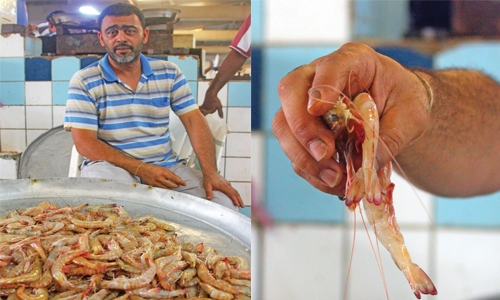Shrimping ban proposal draws mixed reactions
Manama : A ban on shrimping would lead to a safe marine ecology in the Kingdom, according to key fishing industry officials.
Though no official conclusions have been taken on permanently banning shrimping in Bahrain, many government representatives raised their concerns and explained that the traditional method of shrimping is considered harmful to the environment as it affects the balance of the marine ecology.
On the other hand, some of the fishermen at the central market seem to be vexed with the banning proposal as selling shrimps are their main source of income.
There are over 2500 species of shrimps with the most popular being Penaeus semisulcatus in Bahrain. Despite their small size, these intriguing creatures play a vital role in maintaining the ecological balance in marine ecosystems through cleaning up the sea bed by feeding on parasites and remains of dead organisms.
It is to be noted that only 30 per cent of shrimp is collected by the “traditional” shrimping process, while the remaining 70 percent is usually small fish that has no commercial value and is occasionally wasted.
DT News spoke to a few persons to find out their opinion about the ban proposal.
Reem Al Mealla, Marine & Biodiversity Specialist
“The aim of the ban is to allow the stocks to replenish and provide a safe haven for species of fish and shrimps during the mating season. The longer the ban, the better it is for the stocks, allowing the species to grow and reproduce again safely. As Bahrain is known for not being self-food secure, the ban will offer food security to future generations from marine resources. Compensation plans for fishermen affected is highly recommended in order to ensure that they are supported during a time when their source of income is put on hold. The general public also has a huge responsibility towards ensuring that Bahrain’s marine resources including fish and shrimp stocks are protected and conserved thereby aiding the country to attain food security. This can be done by choosing correct decisions and choices. The conservation of marine ecosystems and attaining food security comes under the UN Sustainable Development Goals Scope, which several countries including Bahrain have decided to embrace a year ago. Therefore, it is everyone’s responsibility to ensure that shrimp and fish stocks reach sustainable populations.”
Ali Altaf, a fisherman
“If there is a ban on shrimps, it will adversely affect my income. Many of my clients need shrimps and I have to supply them every day. If the ban is implemented then I will have to import from other countries and deliver it to them.”
Mohammed Toraif Official, Fish Transporters
“We buy fish from the local fishermen, and it includes shrimp. We are able to sell their fresh fish in the same day, thereby benefiting the customers and the local fishermen. The ban on shrimps will affect our business, but we have to respect the ecology of sea and cope up with the situation.”
Related Posts




